Covid-19 66
JCOVID-19 in Cuba, July 2021

July, the most critical month for COVID-19 in Cuba
In the 31 days of the last month, the nation counted 200,398 positive cases of COVID-19, which represents 149,776 cases more than in June, which had been the worst period until then.
Translated and edited by Walter Lippmann for CubaNews.
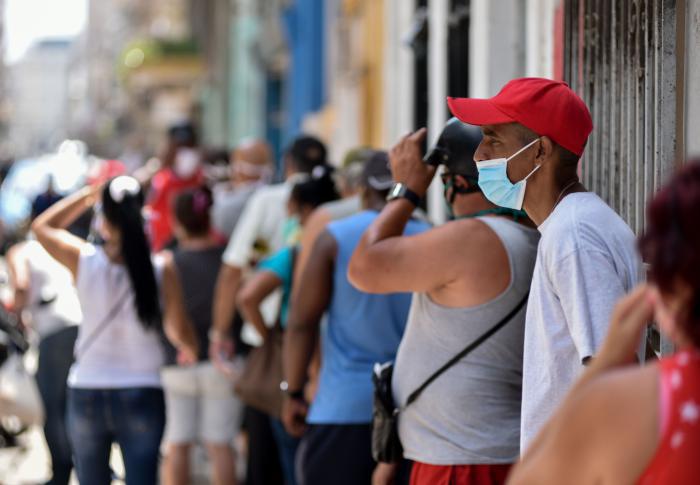
Risk perception in the population is fundamental to contain the dangerous wave of COVID-19 that the country is facing. Photo: Ariel Cecilio Lemus
The spread of more contagious and virulent genetic variants of SARS-COV-2, together with other factors related to the non-compliance with sanitary protocols and the loss of risk perception, caused in the month of July an epidemiological scenario unprecedented in the entire stage of the COVID-19 pandemic in Cuba.
In the 31 days of the finalized month, the nation counted 200,398 positive cases of COVID-19, which represents 149,776 cases more than in June, which had been the worst period until then.
On average, 6,464 positive patients were registered per day, with a peak of 9,747 confirmed cases on July 31 and figures exceeding 8,000 cases for several days, which strained the health system in some parts of the country, with the consequent shortage of medical supplies.
In July, 1,553 people died of the disease (1,216 more than in the previous month), also the highest number reported, including the unfortunate deaths of pregnant women, postpartum women and a 12-year-old girl.
At the end of July 31, the island had a high incidence rate of 1,056.3 cases per 100,000 inhabitants. The province with the highest incidence rate was Matanzas (2,861.4), a territory that went through the worst health crisis of the period, with over 3,000 cases, but which, with the efforts that have been made, has already begun to control the situation.
It is followed by Ciego de Avila (2 500.1), Cienfuegos (2 423.4) and Guantanamo (1 625.7). The rest of the provinces, although they have an index below 1,000, report high numbers of transmission, with the exception of the special municipality Isla de la Juventud, which maintains control of the disease.
The Seven Plagues of Cuba

Letter to a Cousin or, the Seven Plagues of Cuba
 By René González Sehwerert. Hero of the Republic of Cuba. One of the five young revolutionaries who infiltrated terrorist groups that from the cradle of the anti-Cuban mafia, Miami, organize with impunity their criminal attacks against Cuban territory. He was sentenced to 15 years in prison. His cause enjoyed enormous international solidarity. He returned to Cuba in 2013.
By René González Sehwerert. Hero of the Republic of Cuba. One of the five young revolutionaries who infiltrated terrorist groups that from the cradle of the anti-Cuban mafia, Miami, organize with impunity their criminal attacks against Cuban territory. He was sentenced to 15 years in prison. His cause enjoyed enormous international solidarity. He returned to Cuba in 2013.
Translated and edited by Walter Lippmann for CubaNews.
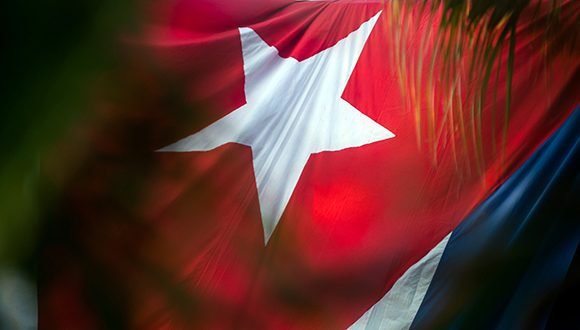
Cuban flag. Photo: Abel Padrón Padilla/ Cubadebate.
Dear cousin:
I am not going to deny to you that there is a clamor from many people -among whom I find myself- demanding solutions. Much less will I justify that someone lives like Carmelina while so many people sacrifice. The problem is that this is the norm all over the planet and nobody seems to care. It is enough for a people to make a revolution to overcome it and they are immediately hit by three plagues.
1- They beat it up, strangle it and attack it so that it cannot solve anything it set out to do.
2- They blame the government that has tried to do so for the shortcomings imposed by the strangler who assaults him.
3- As if that were not enough, they then attack the collective intelligence of the rest of the planet, magnifying everything bad that happens there, in the victimized space, as if the rest of the planet did not do worse every day, before the complicit silence of all.
I would like to read what Fernando Perez wrote. Maybe I have points of agreement with him, who is a person we all here -including the authorities- respect. It is obvious that we have to change many things. But has it not been a perversity to try to suffocate us for 62 years so that we change according to the convenience of those who imposed worse conditions on our parents, and today are imposing worse conditions today around the world? Is it not time to join the world clamor against this blockade that has been suffocating us for too long now, and whose only purpose is to make us surrender out of hunger and despair?
In the end, the dilemma boils down to this: Those who surrender and those who do not. I cannot judge the surrenderers.
Obviously, we have to defend ourselves from those who, in their surrender, also become our victimizers. Many victims have become victimizers throughout history. For example, the crimes of Zionism against Palestine. I am not aware whether or not there were police excesses during the riots that took place in the past days. It is likely that there were.
A peaceful, secure country, fighting calmly against all demons, was suddenly overwhelmed by a violence that is alien to it, imposed by interests that are also alien to it. You tell me that those young people, dressed in uniforms and shields, bats, helmets, etc, whom you describe as teenagers, waiting with a baton to stop the march -or the brown shirts?- break your soul.
I can understand you, but I can’t help wondering: What would they have made you believe if they were giants, with the same clothing and a baton, ready to break the souls of the demonstrators, as happens every day all over the planet? What would CNN in Spanish, or ABC, or El Comercio have told you? Ah, because the three plagues that you believe in are the three plagues that you believe in? Because, in addition to the three plagues I mentioned before, there is a fourth one: this assaulted, assaulted people, under a stranglehold that has tightened on a pandemic that has already tightened on the entire planet, is not even allowed to make a mistake.
Let’s take a look at the cost to the Cuban people of the upsurge of neo-fascism in the last four or five years:
-The brutal assault on the income of Cuba’s medical programs in Brazil, Ecuador and Bolivia, denying us several billions in income and denying the elementary right to life to millions of Latin Americans, without anyone seeming to notice.
– The application of Title III of the Helms-Burton Act, substantially reducing the country’s possibilities of doing business with the rest of the world.
-The bestial aggression against the Cuban family, by breaking their right to send remittances, before the silence of those who claim to clamor for the human rights of Cubans.
– More than 200 measures against the economy and finances of the country, announced publicly before the indifference of the defenders of human rights in Cuba, by the president of the United States of America.
All this was before the arrival of a fifth plague: COVID-19, and its devastating impact on the main economic sector of the island: tourism. But a sixth plague remains: to take advantage of the COVID to tighten the siege, to hinder or prevent the entry of medical supplies.
Do you dare to calculate the impact on the Cuban people, both in terms of billions and human suffering? But when it seems that we already have enough, that we could not bear another blow, the peak of the pandemic infestation occurs and from among those who have been applauding each one of those strangulation measures, displaying unheard-of cynicism and hypocrisy, a perfidious blow to the heart of none other than the people who have faced the COVID in an exemplary manner under aggression: The perverse label of SOSCuba.
And over that people now hangs the seventh plague: a “humanitarian corridor”, at the hand of the most devastating and aggressive war machine in history. Don’t Yugoslavia, Afghanistan, Iraq, Syria ring a bell? It is against this backdrop, meticulously and perversely built for years around the Cuban people, that suddenly the trumpets sound, calling for the slitting of throats, now through the social networks and the increasingly perverted means of incommunication. Cousin coñoñooo! Only that the wall of Nicolás Guillén is not that of Jericho.
The revolutionaries have indeed taken to the streets, but not to “confront the masses”. They are the masses. After the attempted coup -which is what it was, an attempt- they have come out with flags, with hymns and with ideas.
With those ideas we will have to look for solutions, self-criticize where necessary, listen to each other, attend better to the clamors of the people, broaden the spaces for participation, be more inclusive, break the inertia, attract and not exclude, build a more effective and less formal democracy. Because the society we want to build is not conceived to coexist with such levels of violence. That, cousin, we leave it to those who attack us, strangle us, attack us and then, when we have to defend ourselves, they criticize us. Come on, cousin.
A hug. I love you.
Reflections on the current situation in Cuba

Reflections on the current situation in Cuba

By Fabián Escalante. Division General (retd), former head of Cuban intelligence services. Author of several books on the intelligence services of the US against Cuba and has investigated the assassination of John F. Kennedy from the Cuban viewpoint.
Translated and edited by Walter Lippmann for CubaNews.
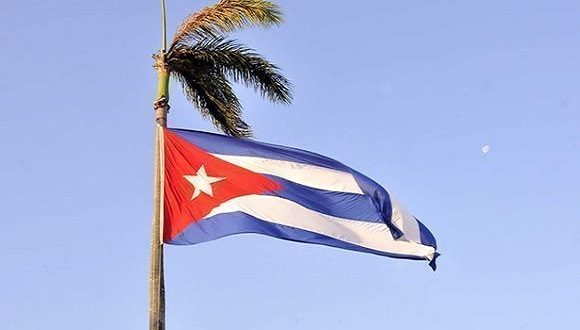
Photo: Jorge Luis Sánchez Rivera/ Cubadebate.
Undoubtedly, the social explosion that took place in our country on July 11 of this year surprised us all, and not for lack of evidence and indications. The social networks, in an Olympic marathon, spread to the four winds slogans, orientations, false news, doctored photos, etc., aimed at manipulating, confusing and deceiving national and international public opinion on the Cuban socio-political situation.
The objective was clear, to take advantage of the dramatic circumstances of hardships and needs produced by the asphyxia of the multilateral blockade decreed by the United States. To this was added circumstantial events, such as the exponential increase of the COVID-19 pandemic and the breakage of the main electricity factory (Guiteras, in Matanzas), which not only affected energy but also the water supply.
To this should be added the difficulties in the supply of food and medicines with the usual long queues, a “mafia” of “black market” born as a result of this, and the mistakes made in the late implementation of economic measures approved some years ago, including food production.
The subversive operation of coup-like magnitude, at least for what is publicly known, was not discovered and unmasked, nor -at least- was the population warned by all available means. A solitary and excellent documentary, The Dictatorship of the Algorithm, shown on Cuban TV, was the most outstanding alert of these weeks. It, however, since it was not conceived as a well-organized media campaign aimed at exploiting the information provided, did not achieve the psychological and political effects and influence on the social consciousness that was necessary and should have been projected, given the imminence of the aggression underway.
The Cuba -and the world- of today is different from that of yesterday, and even more different from that of the first years of the Revolution. These reasons that make it impossible to use the same methods of analysis or crisis management used before. There is a young, depoliticized sector of the population (due to our inefficient political and patriotic work) that does not understand the need to resist imperial policies and who wish to improve their living conditions and do not find an immediate solution to their expectations.
Days have passed since the events described above and, as it happens, many interpretations are coming to light, while the media campaigns in the United States and its allies continue to accuse Cuba of human rights violations and other atrocities, with the open intention of creating the conditions for a U.S. military intervention.
We, revolutionaries, have to meditate and draw lessons from what has happened. The United States and its fascist government is mainly responsible, but -and this is important-, we also have responsibilities for the errors committed. They demand a self-critical analysis, not only marginal references. It is necessary to deepen in the why of them, what were their causes and how we are going to solve them. That is what Fidel taught us and warned us in November 2005 when he stated in a speech at the University of Havana that only the Revolution could destroy itself.
The call to revolutionaries and communists has to be to go on the offensive, to the front line: fight against counterrevolutionary elements from within and without, fight against corruption, bureaucracy, idleness: fight against what is badly done, fight against disappointment and mistrust, against the lack or absence of administrative and political control, fight against “hollow, formal” orientations, in two words, generate ideas, defend concepts and conquests.
To fight against the enemy and bureaucracy would be the duty and responsibility of this historical moment. To use the political, social and mass organizations, supported by the duties and rights provided by our socialist Constitution, not to shy away from direct confrontation and not to be afraid to face conflicts, because as Fidel indicated on many occasions: the best way to defend oneself is to take the offensive.
The combat and confrontation of ideas is taking place today at the base of society, in the block, in the neighborhood, in the community. It is there where the Party and the social and mass organizations must and have to do battle, not to oppress, but to convince, to explain and, if necessary, to transfer to the leadership of the party and the government, the difficulties, misunderstandings and shortcomings.
Passivity makes us accomplices of the errors and negative tendencies that Fidel had already warned in his time.
The enemy campaigns carried out by social networks, by mercenaries of Cuban origin living in Florida, as well as by the media operations of the traditional bourgeois media, must be confronted without hesitation. It is necessary to denounce them, to alert our population, to disarticulate them from within, taking advantage of the enemy’s need to publicize their slogans, orientations and contact their internal promoters. Their activities can be prevented and neutralized, without unnecessary mobilizations, which could wear down and exhaust our forces in the perspective of a long struggle.
External solidarity, as has been called for, must be strengthened to its maximum expression, both in Miami and other North American cities where honest Cubans live, as well as in other cities of the world, where the Cuban attitude of solidarity is well known.
Once again, Fidel summons us to the battle of ideas, which consists in debate and not in imposition, in conviction, in listening and understanding arguments, and accepting those that are fair, because this does not imply concessions of principles, on the contrary, in any case, it reinforces our concept of Revolution, that which Fidel bequeathed to us.
“Trenches of ideas are worth more than trenches of stones”.
Cuba reports 8853 new Covid-19 cases

Cuba reports 8853 new positive cases of COVID-19 and 80 deaths at the close of this Saturday’s press conference
The country accumulates 6 million 208 thousand 857 samples and 332 thousand 968 positive ones
Author: Web Editor
Digital | digital@juventudrebelde.cu
Translated and edited by Walter Lippmann for CubaNews.

Cuba at COVID-19 Author: Minsap Published: 18/08/2020 | 09:17 am
At the close of yesterday, July 24, a total of 60,467 patients were admitted for clinical epidemiological surveillance, 14,864 were suspected, 3,546 were under surveillance, and 42,147 were confirmed active.
For COVID-19, 56,424 samples were studied, resulting in 8853 positive samples. The country accumulates 6 million 208 thousand 857 samples taken and 332 thousand 968 positive.
Of the total number of cases (8853): 8787 were contacts of confirmed cases, 16 with the source of infection abroad and 50 without a source of infection. There were 6147 medical discharges, for a total of 288,414 in the country.
Of the 8853 cases diagnosed, 4747 were female and 4106 were male. The 8853 diagnosed cases belonged to the following age groups: 1632 under 20 years of age, 20 to 39 years 2609, 40 to 59 years 2983, 60 and over 1629.
Of the 8853 positive cases, 5.0% (441) were asymptomatic, for a total of 103,353 cases, representing 31.1% of those confirmed to date.
Distribution of cases by provinces: 8853 cases
Pinar del Río (149)
Artemisa (278)
Havana (1481)
Mayabeque (278)
Matanzas (1461)
Cienfuegos (794)
Villa Clara (383)
Sancti Spíritus (190)
Ciego de Avila (427)
Camagüey (399)
Las Tunas (300)
Holguín (423)
Santiago de Cuba (735)
Granma (131)
Guantanamo (1181)
Of the 332,968 patients diagnosed with the disease, 42,147 remain hospitalized, 41,788 of them with stable clinical evolution. A total of 2351 patients died (80 during the day), two were evacuated, 54 were returned to their countries, 6147 were discharged during the day, and 288,414 patients have recovered. 359 confirmed patients are being treated in intensive care, including 153 critically ill and 206 seriously ill.
Orlando Borrego, on the arduous road

Orlando Borrego, on the arduous road of the Revolution
This Saturday, June 26th, Rebel Army Captain Orlando Borrego Díaz died in Havana, at the age of 85, due to problems associated with the COVID-19.
Translated and edited by Walter Lippmann for CubaNews.

This Saturday, June 26th, Rebel Army Captain Orlando Borrego Díaz died in Havana, at the age of 85, due to problems associated with the COVID-19.
Borrego was born in Holguin, on March 3, 1936. From a very young age he began his revolutionary activities. In October 1958 he joined Column No.8 Ciro Redondo, under the command of Commander Ernesto Guevara, in the Escambray.
After the triumph of the Revolution he occupied various responsibilities as Chief of the Military Economic Board of the La Cabaña Regiment (1959) and of the Industrialization Department of INRA (1959-1960), as First Deputy Minister of the Ministry of Industries (1961-1964) and then as Minister of the Sugar Industry (1964-1968). He also served as advisor to the Executive Committee of the Council of Ministers (1973-1980) and as an economic advisor to the Che Guevara Chair of the University of Havana, as well as to the Minister of Transportation. He was also a close collaborator of Comandante Ernesto Che Guevara.
Orlando Borrego graduated with a degree in Economics from the University of Havana, and in 1980 he obtained the Scientific Degree of Doctor in Economic Sciences at the Institute of Economics and Mathematics of the Academy of Sciences of the USSR.
He was the author of several books, among them: El desarrollo de la Industria Azucarera en Cuba (1965), La ciencia de dirección, antecedentes y enfoques actuales (1987), El Che en el socialismo (1989), El Che del siglo XXI (1997) and Che, el camino del fuego (2001).
For his successful service to the Revolution he received numerous decorations and awards. His body was cremated.
COVID-19 Vaccines: Stories of monopoly, blackmail and inequality

COVID-19 Vaccines: Stories of monopoly, blackmail and inequality
 By Randy Alonso Falcón, Cuban journalist, Director of the web portal Cubadebate, the site Fidel Soldado de las Ideas and the Cuban Television program “Mesa Redonda”. He directed other Cuban publications such as Somos Jóvenes, Alma Mater and Juventud Técnica. He received the Juan Gualberto Gómez National Journalism Award in TV in 2018. He has won several awards in the 26th of July National Journalism Contest. Email: director@cubadebate.cu On Twitter: @RandyAlonsoFalc,
By Randy Alonso Falcón, Cuban journalist, Director of the web portal Cubadebate, the site Fidel Soldado de las Ideas and the Cuban Television program “Mesa Redonda”. He directed other Cuban publications such as Somos Jóvenes, Alma Mater and Juventud Técnica. He received the Juan Gualberto Gómez National Journalism Award in TV in 2018. He has won several awards in the 26th of July National Journalism Contest. Email: director@cubadebate.cu On Twitter: @RandyAlonsoFalc,
 Edilberto Carmona Tamayo, Chief of the Department of Multimedia Production, Monitoring and Innovation of Cubadebate and the Roundtable. Graduated in Journalism in 2016 from the University of Holguín. Contact: edilberto@cubadebate.cu On Twitter: @edctamayo
Edilberto Carmona Tamayo, Chief of the Department of Multimedia Production, Monitoring and Innovation of Cubadebate and the Roundtable. Graduated in Journalism in 2016 from the University of Holguín. Contact: edilberto@cubadebate.cu On Twitter: @edctamayo
March 19, 2020
Translated and edited by Walter Lippmann for CubaNews.
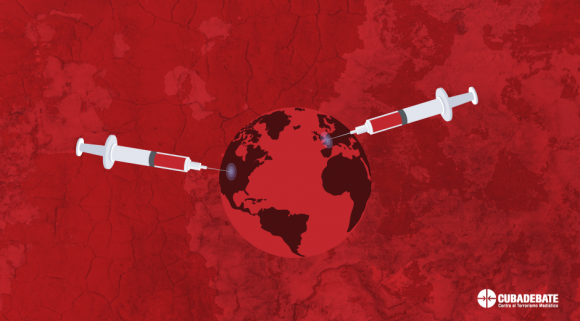
Design: Edilberto Carmona Tamayo
The apprehensions raised in some countries by the AstraZeneca/Oxford vaccine, the US dirty campaign against the Russian Sputnik V and the confirmed refusal of the most powerful nations to let their pharmaceutical companies temporarily release the patents of their antidotes against COVID-19, have further strained the availability of vaccines and deepened the profound differences in the right to life between the powerful and the poor in this world.
Never before has a health emergency struck so many in so many places and in such a short space of time. COVID-19 has already affected more than 120 million people in the world and has caused the death of more than 2.6 million human beings.
Such a universal challenge warranted a global and coordinated response. But once again, contrary to the demands of the UN and the World Health Organization, nationalism, pettiness, the overwhelming power of transnational corporations and every person for themselves, have prevailed.
Vaccines seem to be the only effective barriers against the pandemic. Only immunization of a majority of the world’s population could put a stop to the growing transmission of the SARS-CoV-2 virus. But neither the pharmaceutical transnationals nor the governments of the rich world have that vocation for collective response and global solidarity.
Who can develop and produce vaccines?

The pharmaceutical and biotechnology industry suffers from high concentration and transnationalization. Large companies from developed countries and emerging economies monopolize drug research, production and distribution. Nine of them are among the 100 companies that generate the highest revenues worldwide.
According to Euromonitor Global, the pharmaceutical industry is responsible for almost 4% of global production activity. If it were a country, it would be among the 15 richest economies on the planet. Almost half of the sector’s total sales come from China and the USA, followed by Switzerland, Japan, Germany and France.
The production of vaccines, in particular, concentrates in 4 large firms more than 80% of the market, according to 2019 data: the British GlaxoSmithKline, the American Merck Sharp & Dohme and Pfizer, and the French Sanofi.
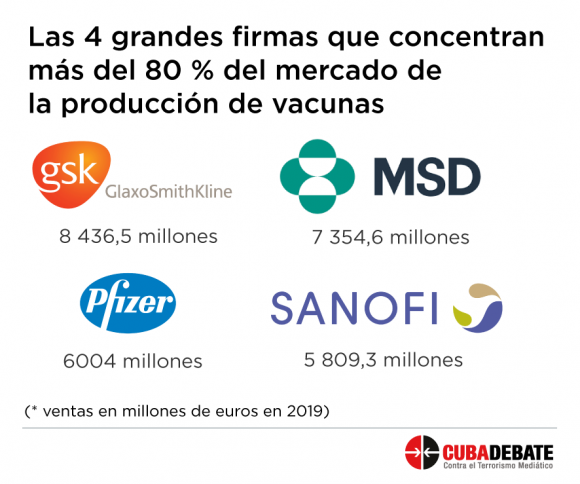
That global market generated in 2018 some $37 billion and it is estimated that by 2027 it will exceed 6$4.5 billion.
As is remarkable, underdeveloped nations -which are the vast majority-, have hardly any capacity to develop their own vaccines (Cuba is one of the few honorable exceptions) and no productive capacities of their own. This has left them with little room for maneuver to influence the uneven development of vaccines in the midst of the pandemic.
How have the vaccines against COVID-19 been financed?

Since the WHO declared COVID-19 a pandemic on March 11, it has been calling for a concerted and joint solution to the threat. But the wrathful logic of the market dictates the course of our world and what has taken place since then is a frantic race to hit the bull’s eye (immune and financial), in which there has been no shortage of obstacles, pressures and even blackmail.
From the outset, the major powers allied themselves with the major pharmaceutical corporations in order to conveniently manage the discovery of a solution that would allow them to emerge with an advantage from the health and economic crisis ravaging the world.
Governments provided at least $8.6 billion for vaccine development, according to analyst firm Airfinity. The US, EU and UK invested billions in AstraZeneca’s vaccine, developed by Oxford University. Germany invested $445 million in the vaccine developed by Pfizer and its German partner, BioNTech. Moderna’s vaccine was fully funded and co-produced by the U.S. government.
While philanthropic organizations contributed $1.9 billion. Individual personalities such as Bill Gates, Alibaba founder Jack Ma and country music star Dolly Parton made contributions.
Only $3.4 billion has come from the pharma companies’ own investment, part of which has also come from external funding.
Despite the fact that Big Pharma has only provided one third of the funding, who is reaping the economic benefits? Who has set the rules of the game in the distribution of vaccines?
Foul Play
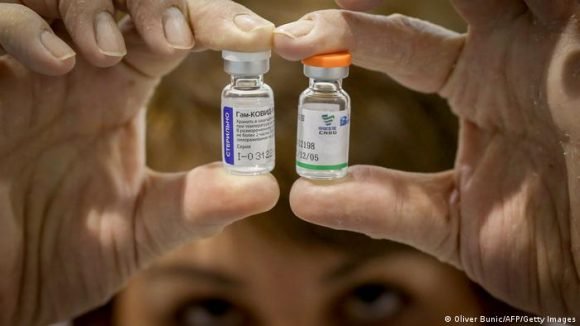
To obtain the vaccine against COVID became, beyond the health interest, a geopolitical objective. Whoever managed to get the vaccine would capitalize on its commoditization and whoever had more financial resources would be able to monopolize more immunizations.
Scandalous was the news of the Trump administration’s maneuver, as early as March 2020, for the German company CureVac -which had begun to research a possible vaccine-, to leave its headquarters in the European country and move to the U.S. in exchange for “large amounts of money”.
As it had also acquired PCR tests, pulmonary ventilators, masks and biosafety equipment, Washington also set out from the beginning to acquire the production and distribution of vaccines.
This was coupled with sometimes subtle, sometimes overt, smear campaigns against Russian and Chinese vaccine candidates in a concerted attempt to shut them out of other markets. Many doubts were cast on the speed of development, quality of clinical trials and effectiveness of the candidates from both nations, especially against Sputnik V from Gamaleya Laboratories.

A nurse prepares a Sputnik V injection at a Moscow clinic. Photo: AFP
After Russia’s leading vaccine was certified by its authorities and sparked interest in several nations, the United States and the European Union have been tripping it up all over the place. The 2020 Annual Report of the U.S. Department of Health and Human Services (HHS) recently revealed that the U.S. Department of Health and Human Services (HHS) recently revealed that the Office of Global Affairs (OGA) used the Office of the Health Attaché in Brazil to persuade the government of that South American country to “reject the Russian COVID-19 vaccine”.

Text subtitled as Combating malign influences in the Americas. Photo Screenshot of HSS annual report
In response to the revelation, Russian presidential spokesman Dimity Peskov stated: “In many countries, the scale of pressure is unprecedented (…) such selfish attempts to force countries to abandon some vaccines lack perspective. We believe that there should be as many doses of vaccines as possible so that all countries, including the poorest, have a chance to stop the pandemic.”
The European Union, for its part, has not yet given the green light to the Russian vaccine for use in its member countries, even though that region has lagged behind the US, Canada, the UK and Israel in vaccine availability, and even though the prestigious health journal The Lancet acknowledged the high efficacy of Sputnik V in a publication.
Beyond such barriers, Russian and Chinese vaccines have been gaining ground in different regions, due to their effectiveness and the global shortage of immunizers. Slovakia even left the European Union fold to acquire 2 million doses of Sputnik V and Hungary, which has also approved the use of the Russian vaccine, acquired doses of the Chinese Sinopharm, which has also not received the green light from the European Medicines Agency.
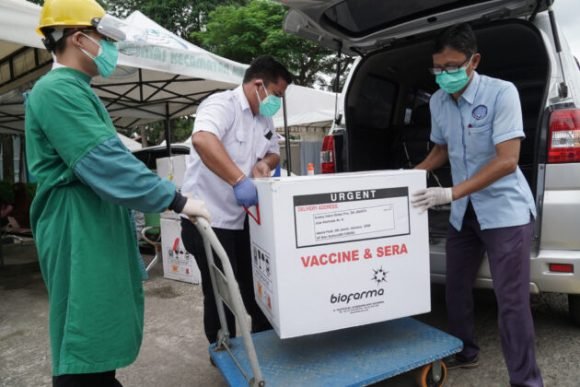
Health workers in Indonesia unload a shipment of Chinese vaccine Sinovac
Blackmail without anesthesia
The States made the major investment, but BigPharma imposes the conditions and keeps the revenues. The monopoly of a few multinationals in the procurement and production of anti-COVID-19 vaccines gives such companies overwhelming power.
Recent reports show how pharmaceutical giant Pfizer has attempted to impose onerous conditions on Latin American nations to supply them with certain quantities of its injectable.
Brazilian President Jair Bolsonaro showed his displeasure these days at Pfizer’s demands on his government, pointing out that among the conditions set by the consortium is a clause in the purchase contract that exempts it from “all liability” for possible side effects of its immunizer.
“We have been very hard and they have been very hard on us. They won’t change a comma. The government is dealing with this together with Congress and it is being discussed in terms of a relaxation of the law”, said the recently dismissed Brazilian Minister of Health, Army General Eduardo Pazuello.
Argentina, Peru and the Dominican Republic also suffered intense pressure from Pfizer, as shown in an investigation by The Bureau Investigative Journalism.
Pfizer representatives in Buenos Aires demanded indemnification against any civil claims citizens might file if they experienced adverse effects after being vaccinated. “We offered to pay for millions of doses upfront, we accepted this international insurance, but the last request was extraordinary: Pfizer demanded that Argentina’s sovereign assets also be part of the legal backing,” an Argentine official confessed. “It was an extreme demand that I had only heard when the foreign debt had to be negotiated, but in that case as in this one, we rejected it immediately.”

The Argentine government believes that Pfizer’s demands were part of a commercial strategy that favored sales to developed countries and not to Latin American countries.
There are several voices that warn that the urgency to have vaccines available for a disease that has left so many dead in the world may have led some governments to accept significant limitations on their responsibilities and demand transparency on the agreements with pharmaceutical companies.
Professor Lawrence Gostin, director of the World Health Organization’s Collaborating Center for National and Global Health Law said, “Pharmaceutical companies should not use their power to limit life-saving vaccines in low- and middle-income countries” and noted that liability protection should not be used as “the sword of Damocles hanging over the heads of desperate countries with desperate populations”.
Even mighty Europe seems to have felt the pressures. Although EU agreements with vaccine manufacturers are kept with their main clauses secret, the Vaccine Procurement Strategy made public by the European Commission states that “the responsibility for the development and use of the vaccine, including any specific compensation required, will lie with the procuring Member States.”
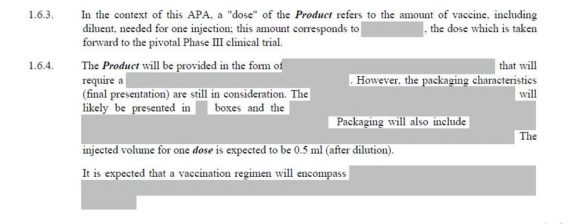
Excerpt from the contract for the purchase of vaccines from CureVac by the European Commission was disclosed with all essential parts blacked out.
Who will be able to be vaccinated in 2021?
Vaccine production capacities in the world are insufficient to have the necessary doses this year to immunize the world’s population. The International Federation of Pharmaceutical Manufacturers and Associations (IFPMA) says that the estimated global demand for vaccines in 2021 is between 10 and 14 billion doses.
According to statistics cited by data firm Statista, the United States can produce nearly 4.7 billion doses of COVID-19 vaccine and India more than 3 billion potential doses. China, previously not a major player in the vaccine export market, has committed to manufacturing more than 1 billion doses.
Great Britain, Russia, Germany and South Korea are also among the established manufacturing centers, but with lower production capacity.

Vacuna Johnson & Johnson. Photo: Reuters.
Given this reality, the inequity and injustice of today’s world are once again evident: the richest countries have purchased most of the vaccines that will be produced in 2021 (even for stockpiling), while poor nations will not have doses to administer even to their most vulnerable segments of the population. More than 100 nations are waiting for the first bulb to arrive.
It is estimated that 90% of the inhabitants of the nearly 70 lowest-income countries will not have the opportunity to be vaccinated against COVID-19 this year.
The most powerful nations took advantage of their purchasing power and investments in vaccine development to secure supplies of the coveted antidote.
So far, about 12.7 billion doses of various coronavirus vaccines have been pre-purchased, enough to vaccinate approximately 6.6 billion people (except for Johnson & Johnson’s, all vaccines approved so far require two doses).
More than half of those doses, 4.2 billion insured, with the option to buy another 2.5 billion, have been purchased by wealthy countries that are home to only 1.2 billion people.
Canada has bought enough doses to inoculate every Canadian five times, while the U.S., U.K., EU, EU, Australia, New Zealand and Chile have bought enough to vaccinate their citizens at least twice, although some of the vaccines have not yet been approved.
Israel struck a deal for 10 million doses and a promise of a steady supply from Pfizer in exchange for data on vaccine recipients. According to reports, the country also paid $30 per dose, double the price paid by the EU.
As Irene Bernal, a researcher on access to medicines at the NGO Salud por Derecho, told the newspaper El País last December, “we are seeing that whoever has the money is the one who has the access. We have kept 53% of the vaccines for 14% of the population, the rich. And the companies have a limited production capacity, so when are the doses going to reach the poorest countries?”
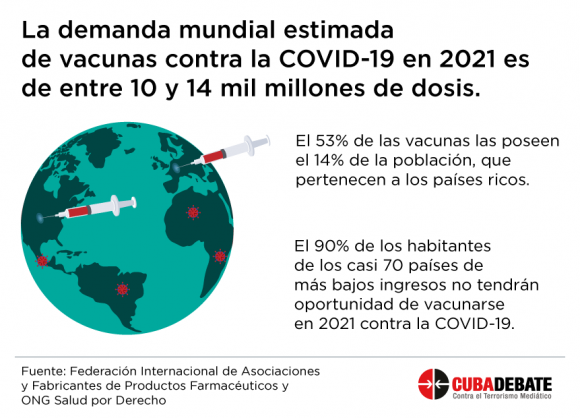
Design: Edilberto Carmona tamayo
Low- and middle-income countries, with 84% of the world’s population, have made deals directly with pharmaceutical companies, but have so far secured only 32% of the supply.
“We are in such a massive crisis,” said Fatima Hassan, founder of the South African Health Justice Initiative. “If even in South Africa we can’t vaccinate half our population soon, I can’t even imagine how Zimbabwe, Lesotho, Namibia and the rest of Africa will cope. If this is going to go on for another three years, we won’t get any kind of continental or global immunity.”
Mexican President Andres Manuel Lopez Obrador and his Foreign Minister Marcelo Ebrard have asked the U.S. authorities to allow them to acquire part of the tens of millions of AstraZeneca vaccines produced in the United States, which Washington has stockpiled without having approved the use of this drug. Other countries that have already authorized this vaccine are begging to have them.
Mexico, one of the countries with the largest presence of COVID-19, has so far administered some 4.4 million doses using Pfizer, AstraZeneca, Sinovac and Sputnik V vaccines, in a population of more than 128 million inhabitants, which means a low vaccination rate, according to the website www.ourworldindata.org managed by the University of Oxford.
The most current statistics from this observatory show the low proportion and unequal distribution of the number of fully vaccinated people (with all the necessary doses) in the world:
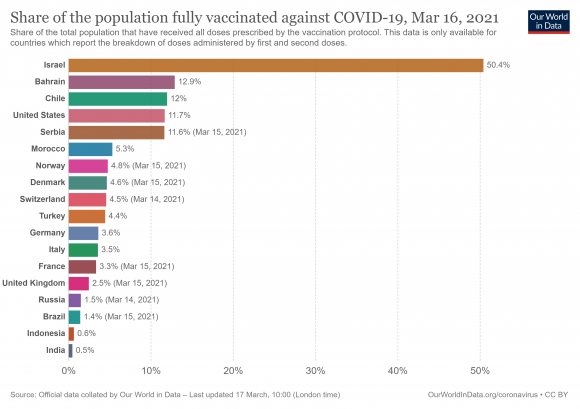
Percentage of population fully vaccinated with required doses by country, March 16, 2021. Graphic: OurWorldinData /Oxford University
According to data collected by Bloomberg, as of Thursday, more than 410 million doses of anti-COVID vaccines have been administered worldwide in some 132 countries. This represents just 2.7% of the world’s population.
| % of population | |||||
|---|---|---|---|---|---|
| Country | Doses administered | Enough for % of people | given 1+ dose | fully vaccinated | Daily rate of doses administered |
| Global Total | 410,697,435 | – | – | – | 9,959,983 |
| U.S. | 115,730,008 | 17.7 | 22.7 | 12.3 | 2,503,731 |
| China | 64,980,000 | 2.3 | – | – | 960,000 |
| EU | 54,084,195 | 6.1 | 8.3 | 3.6 | 1,236,527 |
| India | 38,920,259 | 1.4 | 2.3 | 0.5 | 1,835,249 |
| U.K. | 27,614,526 | 20.7 | 38.5 | 2.8 | 458,471 |
| Brazil | 14,936,060 | 3.6 | 5.2 | 1.9 | 357,115 |
| Turkey | 12,707,210 | 7.6 | 9.6 | 5.7 | 306,998 |
| Germany | 10,067,955 | 6.1 | 8.4 | 3.7 | 233,813 |
| Israel | 9,609,766 | 53.1 | 57.1 | 49.1 | 76,526 |
| Russia | 8,500,000 | 2.9 | 3.4 | 2.4 | 100,000 |
| France | 7,927,771 | 6.1 | 8.7 | 3.5 | 214,391 |
| Chile | 7,907,275 | 20.7 | 27.9 | 13.5 | 290,378 |
| Italy | 7,330,104 | 6.1 | 8.4 | 3.8 | 178,874 |
| UAE | 6,980,466 | 32.5 | – | – | 81,874 |
| Indonesia | 6,787,283 | 1.3 | 1.8 | 0.7 | 256,516 |
| Morocco | 6,499,476 | 9.1 | 12.0 | 6.3 | 199,542 |
| Spain | 5,993,363 | 6.4 | 8.8 | 4.1 | 117,322 |
| Poland | 4,738,902 | 6.2 | 8.1 | 4.4 | 72,826 |
| Mexico | 4,737,622 | 1.9 | 3.2 | 0.5 | 178,501 |
Vaccine Apartheid
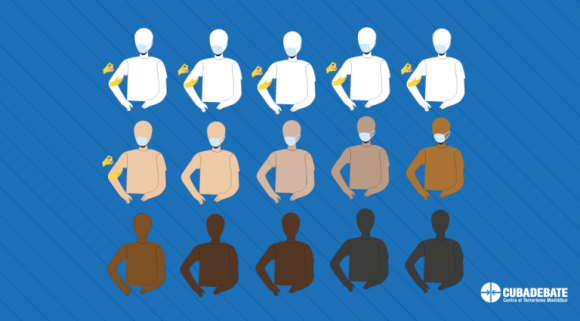
Design: Edilberto Carmona Tamayo
Scientists and activists warn that we are heading towards a “vaccine apartheid” in which people in the global South will be vaccinated years later than those in the West.
Not only will poorer countries be forced to wait, but many are already being charged much higher prices per dose. Uganda, for example, has announced a deal for millions of vaccines from AstraZeneca, at a price of $7 a dose, more than three times what the European Union paid for it. Including transport fees, it will cost $17 to fully vaccinate a Ugandan.
The effects of this inequity would be severe. A model developed by Northeastern University indicates that if the first 2 billion doses of Covid-19 vaccines were distributed proportionally by national population, deaths worldwide would be reduced by 61%. But if the doses are monopolized by 47 of the world’s richest countries, only 33% fewer people would be saved.
Scientists are also concerned that if there are countries that will not be able to immunize a large part of the population, there will be more opportunities for the virus to continue mutating and deaths will increase in these under-vaccinated countries, making the available vaccines less effective over time.
As WHO Director-General Dr. Tedros Adhanom Ghebreyesus noted earlier this year, “…we face a real danger that, while vaccines bring hope to some, they become one more brick in the wall of inequality between those who have resources and those who do not.”
A restrained alternative
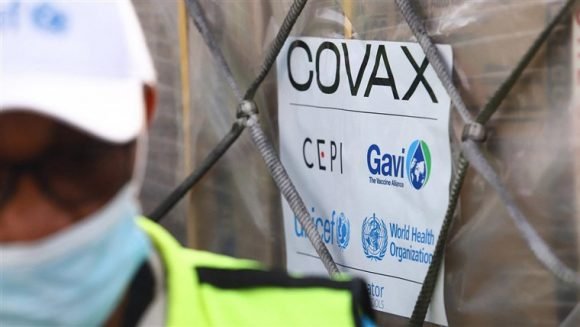
The difficulty in securing vaccine supply will make many poorer countries dependent on Covax, an organization created in April 2020, coordinated by WHO, the Coalition for Innovations in Epidemic Preparedness and GAVI, the international vaccine alliance.
Covax aims to administer 2 billion doses globally, including at least 1.3 billion for 92 low- and middle-income countries, by the end of 2021. This would be enough to inoculate 20% of each country’s population, with priority given to healthcare workers, the elderly and people with underlying medical conditions, although that target has been criticized as inadequate to deal with the pandemic.
Analysts estimate instead that Covax will at most provide between 650 million and 950 million doses, divided among 145 nations, including some of those with enough confirmed agreements for the vaccines to vaccinate their citizens multiple times such as Canada and New Zealand.
The pharmaceuticals have not delivered on their promises to COVAX and AstraZeneca, which was the main supplier is also facing its own particular situation of millions of doses withheld in the US and Europe.
Even Europe is not spared from the backlog
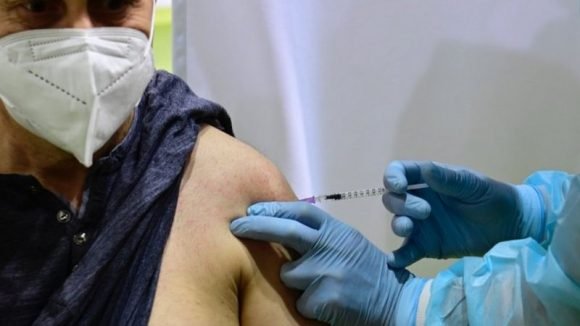
Germany suspended vaccination with AstraZeneca as of Monday 15. Photo: EPA Even the European Union is frustrated by the obstacles they have encountered in vaccinating their population. The only European vaccine so far, the AstraZeneca/Oxford vaccine, is in serious trouble after reports of some 30 cases of clotting problems in people immunized with the injectable. There are already 13 EU countries that have suspended vaccination with AstaZeneca, despite the fact that the WHO and the European regulatory agency defend its use as having more benefits than harmful impact.
To make matters worse, in the midst of the flare-up in the region, AstraZeneca had only delivered 25% of the agreed doses to the EU for the first quarter and Pfizer was also behind in its deliveries. In early 2021 Italy threatened to sue Pfizer for reducing by 29% the distribution of doses in that country. Now the European Commission announces that it has reached an agreement with Pfizer/BioNTech to bring forward 10 million doses for the second quarter of the year.
Despite the fact that BioNtech and CureVac are German, this European country has had problems with vaccination. The daily Der Spiegel pointed out a few weeks ago that “the European Union and Germany could run short of vaccine supplies. The delay in signing contracts with pharmaceutical companies could mean that the vaccines arrive late, as well as not being sufficient”.
The EU has so far administered 11 doses per 100 people, compared with 33 doses in the US and 39 doses in the UK, according to the Bloomberg Vaccine Tracker index.
The low availability and unequal distribution within the European Union has led countries such as Austria, Bulgaria, Czech Republic, Croatia and Latvia to publicly express their discomfort and ask for a “correction” in the distribution.
In view of the dilemma, the European Commission determined that the pharmaceutical companies which have vaccine factories in EU territories will not be able to export the products they generate to other regions if they do not receive permission to take them out of the country from the authorities of those nations.
Already on March 4, Italy, one of the countries hardest hit by the pandemic, took advantage of this EU decision to ban the export to Australia of 250,000 doses of Astrazeneca’s vaccine, which the Anglo-Swedish pharmaceutical company produced at its factory in Agnani, near Rome.
As frustrations grow more intense, some European officials are blaming the United States and the United Kingdom. European Council President Charles Michel said the U.S., along with Britain, “have imposed a total ban on the export of vaccines or vaccine components that are produced on their territory.”
Asked about this, Jen Psaki, the White House press secretary, told reporters that vaccine manufacturers were free to export their U.S.-made products as long as they met the terms of their contracts with the [U.S.] government.
But because AstraZeneca’s vaccine was produced with help from the Defense Production Act, for which it received more than $1 billion in funding, Biden has to approve overseas shipments of its doses.
No holds barred for a round deal
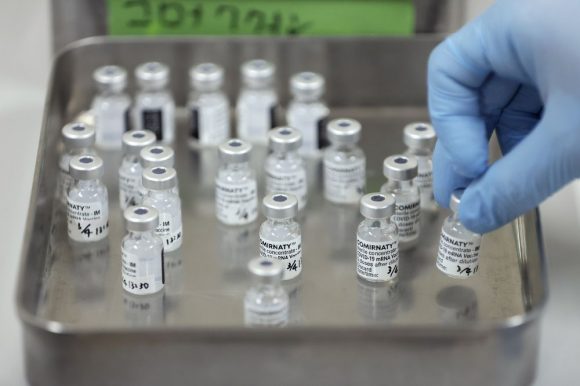
The most powerful countries have put pharmaceutical profits above global immunity, despite political discourse that there will be no solution to the pandemic unless it is corralled worldwide.
Last week, on the same day marking one year since WHO declared COVID-19 a pandemic, the US, EU, UK and Canada (all with sufficient vaccines secured) blocked the latest attempt by poor or middle-income nations to speed access to vaccines and treatments for COVID-19 by temporarily lifting World Trade Organization rules protecting intellectual property.
A resolution sponsored by South Africa and India and backed by 57 countries, which called for suspending during the pandemic parts of the TRIPS (Trade Related Protections for Intellectual Property Rights) Agreement that protects medical patents, was rejected by the bloc of rich nations. It had already met the same fate in discussions at the WTO in October and December 2020.
An agreement would have allowed underdeveloped or emerging nations to produce COVID drugs and vaccines without waiting for or adhering to licensing agreements with pharmaceutical companies that own the intellectual property of these medical products. This would have expanded the production of antidotes against the lethal disease and lowered treatment costs.
The governments of wealthy nations, the majority financiers of the anti-COVID vaccines, based their refusal on concerns that the release of intellectual property, even temporarily, could reduce incentives for corporate research and also questioned whether “developing” nations could begin production of the drugs soon enough to prevent the spread of the virus.
The truth is that Big Pharma multinationals were initially reluctant to fund COVID vaccine research because of the uncertainty of a race against time to get results and because of the poor cost-effectiveness of creating vaccines for health emergencies in the past.
The drugs sought by these companies are primarily those offered to citizens of wealthy countries, and especially those needed for chronic diseases requiring routine doses, which make them highly profitable.
But after they have seen the profitability that the durability in time of COVID-19 can leave them, they do not want now any limit to the “party” of income that they are enjoying in view of the urgent demand for vaccines.
Moderna reported that it has signed advance purchase agreements for more than US$18 billion for supplies to be delivered this year, while Pfizer projected nearly US$15 billion in revenues this year for its vaccine with BioNTech.

Boxes containing Modern COVID-19 vaccine are prepared for shipment at McKesson’s distribution center in Olive Branch, Mississippi, U.S., Dec. 20, 2020. Photo: Reuters
The main vaccine developers have benefited from billions of dollars in public subsidies, yet pharmaceutical companies have been granted a monopoly over their production, as well as over the profits they generate.
The prices at which vaccines are sold to different countries (they vary) are kept under the veil of secrecy of the agreements signed between pharmaceutical companies and governments, although the specialized website Statista has calculated the average price per dose at these amounts:
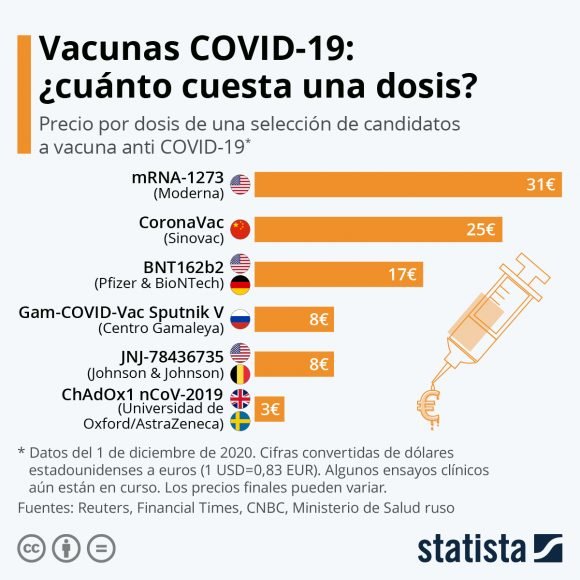
Multiply those numbers by the billions of doses required every x years (depending on the length of time these vaccines achieve immunity) and you can calculate how much the dance of the millions will amount to.
But, while pharmaceutical companies profit and control the pace and scope of vaccinations, the costs of the unequal distribution of vaccines to the global economy could be as high as $9 billion, according to Katie Gallogly-Swan, a researcher working with the United Nations Conference on Trade and Development (UNCTAD).
“It is unconscionable that in the midst of a global health crisis, huge multi-billion dollar pharmaceutical companies continue to prioritize profits, protect their monopolies and raise prices, instead of prioritizing the lives of people everywhere, including the Global South, U.S. Senator Bernie Sanders aptly tweeted a few days ago.
“The world is on the brink of a catastrophic moral failure” has written the Director-General of the World Health Organization. Meanwhile, over here, we cross our fingers for Soberana and Abdala to immunize all of us, without distinction, before this year expires.
Hotels as anti-COVID-19 isolation centers
SPECIAL: Cuba uses hotels as anti-COVID-19 isolation centers
Updated 2021-03-18 05:03:44 | Spanish. xinhuanet. com
By Raul Menchaca
Translated and edited by Walter Lippmann for CubaNews

mage from March 16, 2021 of an employee sanitizing the hands of a foreign visitor at the entrance of the Capri Hotel, which is being occupied as an isolation center, in Havana, capital of Cuba. Cuba has set up some 20 hotels, mostly in Havana, as isolation centers where travelers arriving from abroad spend a few days until it is confirmed that they are not infected with the new coronavirus. (Xinhua/Joaquín Hernández)
HAVANA, Mar. 17 (Xinhua) — Cuba has set up a score of hotels, mostly in Havana, as isolation centers where travelers arriving from abroad spend a few days until confirming that they are not infected with the new coronavirus.
Since the beginning of February and in view of a third outbreak of the pandemic, the authorities determined the isolation of these travelers, who must also present a negative molecular biology test, the so-called PCR test, carried out 72 hours before their arrival in Cuba.
The isolation has two modalities since there are paid hotels for foreigners and Cubans who opt for them and free centers only for Cubans, but with less comfort.
Travelers remain isolated for five nights until they know the results of the PCR test performed at the airports and another one at the hotel, where they also have daily sanitary control, since in each facility there is a doctor and a nurse, who twice a day examine each traveler.
“It’s a little stressful to be locked up, but I understand that it is the sanitary protocol to protect us and others,” Cuban Yosvany Barrios, who lives in the southern United States and returned to the island to spend a few days with his wife, who is four months pregnant, told Xinhua.
Barrios, a construction contractor, who stayed at the downtown Havana hotel NH Capri, said he feels safe with these measures, which help him “also to take care of my wife and the future baby”.
This opinion is shared by Jorge Carmona, another Cuban who also lives in the United States and who said he understands the need for these restrictions, despite the fact that it is uncomfortable to be locked up for so many days.
Visitors are not allowed to leave their rooms, pending the result of the PCR test, and can only leave them when it is confirmed that they are not infected.
“This prevents contact between people and therefore transmission,” said Dr. Juan Carlos Vidaud, an intensivist who usually works in a Havana hospital, but who with the arrival of the pandemic has been assigned to health surveillance at the NH Capri Hotel, where more than 100 people are staying.
For a month and a half, Vidaud has attended to more than 200 travelers staying at the hotel and explained that only four have tested positive for COVID-19, which has activated a rigorous emergency plan to transfer them to hospitals where they received specialized medical care.
It is a new reality for the now depressed Cuban tourism sector, once the second-largest contributor of foreign currency to the island, with some 3.1 billion dollars annually, only surpassed by the export of medical services, but today hard hit by the pandemic.
“We have a different clientele than we had before. There is a pre-COVID client and now there is a post-COVID client,” said Spain’s Juan Francisco Candeal, general manager of the NH Capri and NH Victoria hotels.
Candeal, a man of vast experience in the hotel industry, noted that the facilities he manages have modified more than 700 actions to conform to a strict sanitary protocol and protect clients and workers.
“I think that within this great misfortune that we are all going through, it has been a great improvement for the tourism industry,” said the executive of the Spanish chain.
Cuban authorities had closed the borders in April last year, but reopened them on November 1, which with the massive arrival of travelers for the end-of-year holidays gave rise to the current third outbreak of the disease on the island.
Therefore, at the beginning of February, in addition to the sanitary protocol in airports, the list of countries with restricted regular flights was extended to include the United States, Mexico, Panama, Dominican Republic, Bahamas, Colombia and Jamaica, and connections with Nicaragua, Guyana, Trinidad and Tobago, and Suriname were suspended.
Measures such as the suspension of the school year and the closure of public places such as theaters, bars and restaurants were also applied throughout the country.
In Havana, the main source of transmission of the disease, the authorities are maintaining restrictive sanitary measures that include limiting circulation from 21:00 local time until 5:00 hours the following day, as well as severe fines for those who do not use or misuse masks.
Since the Sars-CoV-2 virus, which causes the new coronavirus disease (COVID-19), was first recorded on the island a year ago, Cuba has accumulated 63,725 infected people and 380 deaths.

HAVANA, March 17, 2021 (Xinhua) — Picture on March 16, 2021 of an employee moving the luggage of a foreign visitor at the Capri Hotel, which is being occupied as an isolation center, in Havana, capital of Cuba. Cuba has set up some 20 hotels, mostly in Havana, as isolation centers where travelers arriving from abroad spend a few days until it is confirmed that they are not infected with the new coronavirus. (Xinhua/Joaquín Hernández)

HAVANA, March 17, 2021 (Xinhua) — March 16, 2021 image of a foreign visitor being checked by a Cuban doctor at the Capri Hotel, which is being occupied as an isolation center, in Havana, capital of Cuba. Cuba has set up some 20 hotels, mostly in Havana, as isolation centers where travelers arriving from abroad spend a few days until it is confirmed that they are not infected with the new coronavirus. (Xinhua/Joaquín Hernández)

HAVANA, March 17, 2021 (Xinhua) — March 16, 2021 image of an employee knocking on a room door to deliver food service to a foreign visitor at the Capri Hotel, which is being occupied as an isolation center, in Havana, capital of Cuba. Cuba has set up some 20 hotels, mostly in Havana, as isolation centers where travelers arriving from abroad spend a few days until it is confirmed that they are not infected with the new coronavirus. (Xinhua/Joaquín Hernández)

HAVANA, March 17, 2021 (Xinhua) — March 16, 2021 image of people walking in front of the Capri Hotel, which is being occupied as an isolation center, in Havana, capital of Cuba. Cuba has set up some 20 hotels, mostly in Havana, as isolation centers where travelers arriving from abroad spend a few days until it is confirmed that they are not infected with the new coronavirus. (Xinhua/Joaquín Hernández)

HAVANA, March 17, 2021 (Xinhua) — March 16, 2021 image of a Cuban nurse performing a body temperature check on a foreign visitor at the Capri Hotel, which is being occupied as an isolation center, in Havana, capital of Cuba. Cuba has set up some 20 hotels, mostly in Havana, as isolation centers where travelers arriving from abroad spend a few days until it is confirmed that they are not infected with the new coronavirus. (Xinhua/Joaquín Hernández)

HAVANA, March 17, 2021 (Xinhua) — March 16, 2021 image of people coming from abroad checking in at the Capri Hotel, which is being occupied as an isolation center, in Havana, capital of Cuba. Cuba has set up some 20 hotels, mostly in Havana, as isolation centers where travelers arriving from abroad spend a few days until it is confirmed that they are not infected with the new coronavirus. (Xinhua/Joaquín Hernández)
Mujica backs Cuban doctors for Nobel

Pepe Mujica: “It is an honor to support the candidacy for the Nobel Peace Prize for Cuban doctors”.
 By Maribel Acosta Damas. Cuban journalist, specialized in Television. She is a professor at the Faculty of Journalism of the University of Havana and holds a PhD in Communication Sciences.
By Maribel Acosta Damas. Cuban journalist, specialized in Television. She is a professor at the Faculty of Journalism of the University of Havana and holds a PhD in Communication Sciences.
March 12, 2021
Translated and edited by Walter Lippmann for CubaNews.
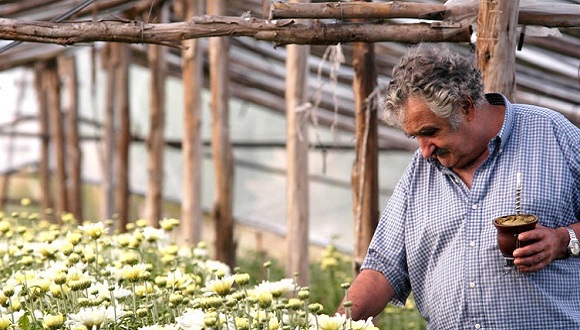
Pepe Mujica, Minister of Livestock and Agriculture in the first government of Tabaré Vázquez in 2005 and then President of Uruguay between 2010 and 2015. Photo: Resumen Latinoamericano.
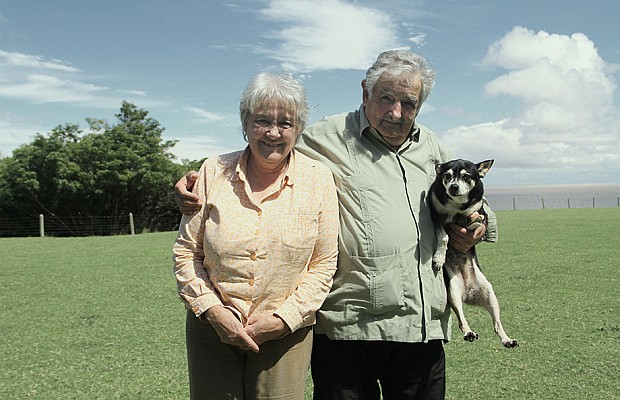
Photo taken from Cubaenresumen.org
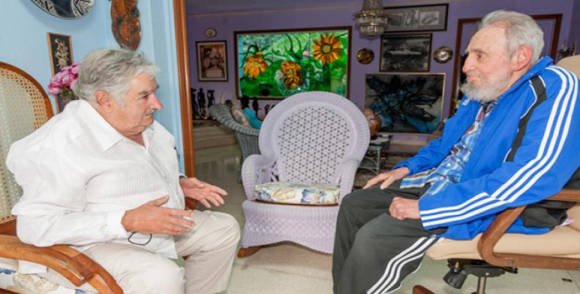
In my living room I have a picture of Che, and I have his letters in my memoirs, in a notebook. It turned out that Evo Morales wanted to make a faithful reproduction of Che’s wallet in the Bolivian guerrilla, the last one he had. Evo Morales had it made as a gift to his friends, and I have it. Inside there is also the facsimile copy of the campaign diary and a notebook… I keep it hanging… and I always show it to them when they come to visit. Che is still there. For us, it is an indelible attitude, no matter how much time goes by…
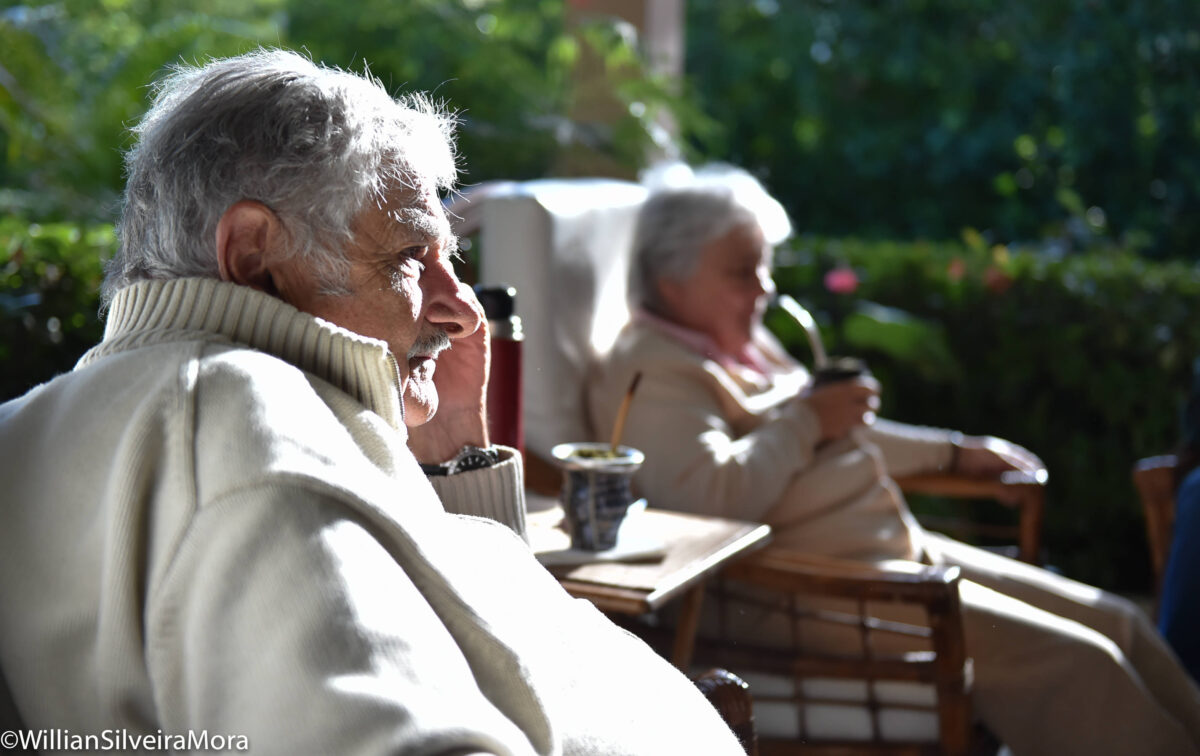
José “Pepe” Mujica and Lucía Topolansky at the Uruguayan ambassador’s residence in Havana, January 25, 2015. Photo: William Silveira Mora
We receive all this when we are born. So we have to try to leave something behind for those who will come after us. The world will not improve if there are no people who are concerned about its improvement. The world improves because of the work of people who make an effort.
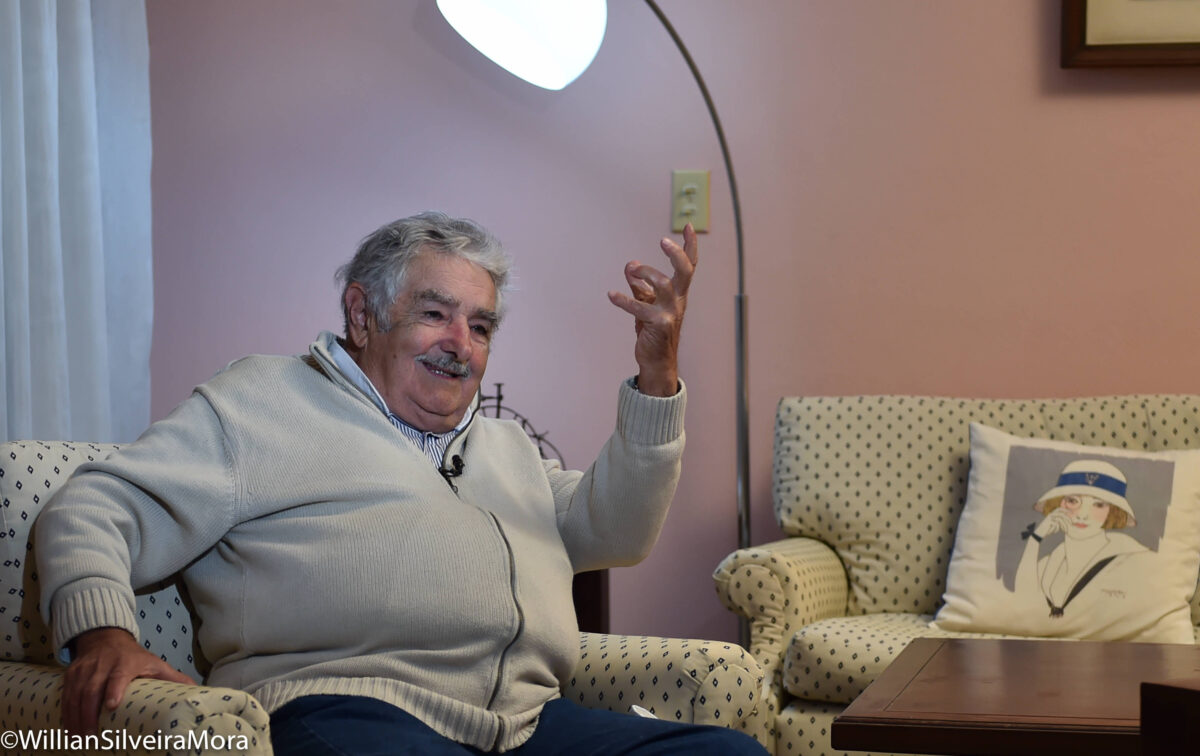
Pepe Mujica gives an interview to Randy Alonso Falcón for the Round Table, Havana, January 25, 2016. Photo: William Silveira Mora
Now there is the internet, there is the university, so it is as if the old people are superfluous, they are left over… It is a world that only wants young people, absolutely young, and then the old men and women disguise themselves to look younger. They all want to be young and they revoke themselves: they dye their hair, they remove wrinkles, they bother with fatness… in short…
Old people are on the way to being discarded. However, sometimes old people see farther because they have lived longer and if they are not yet crippled they have the function of trying to tell things to younger people that probably they are not going to understand them at that moment, but one day they will realize that they did not see part of reality… In Asian villages there is a great reverence for old people, but in Western villages there is no reverence. That is why it is good to retire…
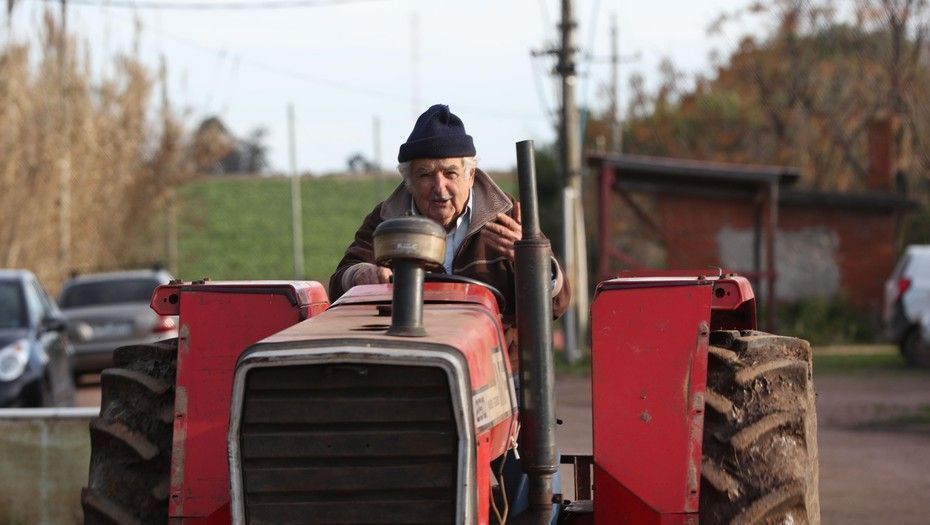
The former Uruguayan president is known for his modest lifestyle and direct speech. Photo: EFE
Inequality Exposed in the Face of Covid-19

Inequality also surfaces in the face of the pandemic
Immunizing their populations may be as difficult for many states as the COVID-19 scourge itself.
Posted: Saturday 27 February 2021 | 08:16:08 pm.
Author:  Marina Menéndez Quintero | marina@juventudrebelde.cu
Marina Menéndez Quintero | marina@juventudrebelde.cu
Translated and edited by Walter Lippmann for CubaNews.
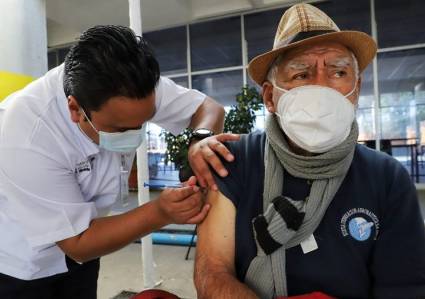
The arrival of Sputnik V was received with enthusiasm in the Mexican capital. Autor: @ClaudiaShein Published: 27/02/2021 | 07:48 pm
Assets, buildings and even military bases. What no country would put at stake, should serve as a guarantee against possible legal claims…
Abusive demands, some said; others sniffed out a hypothetical ulterior motive, and third parties even concluded that such far-reaching forecasts showed too much distrust of the manufacturer’s own product.
What is palpable is that the revelations about the unimaginable conditions that the pharmaceutical company Pfizer has imposed on Latin American countries in order to sell its vaccine against COVID-19, are a clear illustration of the concerns expressed by the World Health Organization (WHO) and by the UN Secretary General himself, about the difficulties that poor nations will have to face in order to immunize their populations.
“I must be frank: the world is on the brink of catastrophic moral failure, and the price of this failure will be paid in the lives and livelihoods of the poorest countries,” warned Tedros Adhanom Ghebreyesus, director general of the WHO, last month, drawing attention to the huge inequality in access to vaccines around the world.
UN Secretary General Antonio Guterres reiterated warnings about how inequity caused by the unfair global economic order and lack of cooperation will once again prey on the poor – now in the face of a deadly threat as direct as the pandemic – when he criticized what he called the “grossly unequal and unfair” distribution of the vaccine.
At that time, he pointed out, only ten countries had administered 75 percent of all the doses distributed worldwide, while more than 130 countries had yet to receive a single dose.
In this context, the revelations made public a few days ago by The Bureau of Investigative Journalism (TBIJ) – a news organization dedicated to investigative journalism based in London – and the Peruvian media Ojo Público, based in Lima, about the difficult negotiations of nations such as Argentina and Brazil to acquire the vaccine produced by the pharmaceutical company Pfizer, acquire support.
Their harsh and unusual demands illustrate the additional obstacles that resource-poor nations, including those more solvent ones that have not produced their own vaccine, may face, beyond the lack of current money.
As the journalistic investigation acknowledged, “most governments offer indemnification (exemption from legal liability) to the vaccine manufacturers they buy from.”
That is, the government would pay for any lawsuits against the manufacturer that a vaccinated person might file. “This is fairly typical of vaccines administered in a pandemic,” he noted, even though adverse effects are very rare.
However, Pfizer’s demands for Argentina and another nation, whose representatives have remained anonymous because negotiations are continuing, went further, asking for additional indemnification against any claims, officials in Buenos Aires said.
After representatives of the southern cone nation had negotiated difficult requirements that demanded changes in its legislation, Pfizer went so far as to demand “that the sovereign assets be part of the legal backing,” said a participant in the negotiation.
This happened at the end of December. It involved the Argentine government putting up its sovereign assets – which could include federal bank reserves, embassy buildings or military bases – as collateral against potential claims.
“We offered to pay millions of doses in advance, we accepted this international insurance, but the last request was extraordinary (…). It was an extreme demand that I had only heard when it was necessary to negotiate the foreign debt; but in that case, as in this one, we rejected it immediately”, the source affirmed.
Similar conditions were imposed to countries such as Brazil, where there were no agreements until today.
According to a message on Twitter by Misión Verdad, nine countries in Latin America and the Caribbean have reached agreements with Pfizer.
Although the tweet states that “the terms of these commercial agreements are not known” -and in truth it is information that in many cases is confidential-, the investigation by The Bureau… and Ojo Público gives an account of the rigors faced by Peru, and the “set of binding conditions” that it had to sign to close the agreement.
These included a supreme executive decree by which the nation committed to submit to international arbitration if disputes arose in the contracts for the purchase of the lots. At the same time, Peru waived “the sovereign immunity of the State for the enforcement of an arbitration decision”.
Contacted by The Bureau…, Pfizer declined to discuss the ongoing private negotiations, but argued that it has allocated doses to low- and middle-income countries at not-for-profit prices, including an advance purchase agreement to supply up to 40 million doses to Covax: a UN-sponsored project, and the only one worldwide that aims to facilitate access to vaccines for poor countries.
Meanwhile, vaccines that were initially viewed with apprehension, such as the Russian Sputnik V, are increasingly being used in Latin American countries.
Although Mexico has also acquired the Pfizer vaccine, in a message published on Twitter on the 23rd, Foreign Minister Marcelo Ebrard thanked President Vladimir Putin, the Russian Foreign Minister and the Ambassador in his country “for their support in making possible the arrival of Sputnik V vaccines to our country. Mexico-Russia friendship grows stronger,” he wrote. More than 20 million doses arrived from Moscow, far exceeding the thousands of vaccines from other companies that had arrived until then.
It is known that Sputnik V has also been acquired by Venezuela, Argentina, Paraguay, Colombia and Bolivia. In Peru its acquisition has been recommended and it has been reported that Brazil is planning to buy it, while it was expected to arrive in Chile. Reports state that in Ecuador contacts have been maintained with suppliers.
Meanwhile, reports from the Russian Embassy in Mexico state that the Russian Direct Investment Fund is looking for allies to produce Sputnik V in that Latin American nation.
In the midst of so much selfishness, the purpose could be evidence of humanistic logic. Mexico is the second country in the Americas with the second highest death rate from COVID-19.
But there is no shortage of people who appreciate the growing presence of Sputnik V as an expression of Moscow’s growing influence in the region.
Cooperation is needed
One hundred and eighty nations have endorsed the Covax initiative, which needs the help of rich countries to provide the funds to buy the drug. Ghana became the first country to receive a batch this week.
However, the pace may be very slow. According to officials involved in the initiative, the aim through Covax is to be able to vaccinate just 20 percent of the most vulnerable population in each participating country by the end of this year.
The People’s Vaccine Alliance coalition, a network of organizations including Amnesty International, Oxfam and Global Justice Now, estimates that nearly 70 low-income countries could vaccinate only one in ten citizens.
The response from potential donors is still not registering at the required level. Dr. Tedros explained that vaccines can only be delivered to Covax member countries if rich nations cooperate and honor contracts, referring to commitments made by the United States and the European Union to significantly increase their contribution.
On the other hand, regional solidarity initiatives are trying to help and could be very effective if they were more generalized.
An example of cooperation actions that could help is provided by ALBA-TCP (Bolivarian Alliance for the Peoples of Our America and the Peoples’ Trade Agreement), whose Bank announced in December – by the decision of the most recent Summit – the creation of a modest fund of two million dollars as financial relief to member countries that needed to acquire the vaccine and had not concluded negotiations with the supplying companies due to lack of money.
The availability or otherwise of the vaccine by all nations will be absolutely decisive in the planet’s triumph over the pandemic. Faced with COVID-19, we will either all emerge or we will all stagnate.
Cuba to immunize its entire population

Cuba will be among the first countries to immunize its entire population.
Speaking at the Round Table space, the president of BioCubaFarma said that the vaccine production and distribution capacities have already been analyzed and organized for their programming until next December, once the studies of the four vaccine candidates yield the expected satisfactory results.
Published: Thursday 04 February 2021 | 11:43:53 pm.
Author: Ana Maria Dominguez Cruz

Translated and edited by Walter Lippmann for CubaNews.
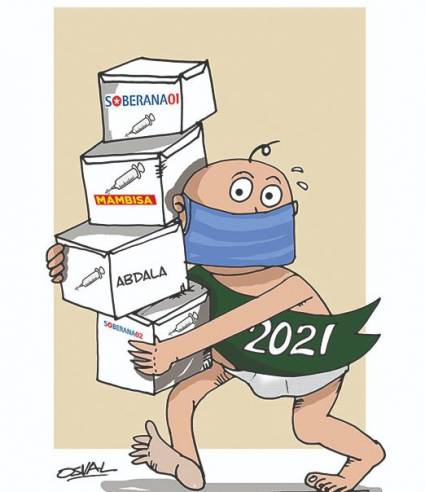
Cuba develops four vaccine candidates against COVID-19.
The confidence that Cuba will be one of the first countries that will be able to immunize its entire population from its existing capacities of production and distribution of vaccines against COVID-19 came this Thursday at the Round Table, dedicated to the subject.
Eduardo Martínez Díaz, president of BioCubaFarma, explained this while speaking on the radio-TV program, together with Marta Ayala Ávila, general director of the Center for Genetic Engineering and Biotechnology; Vicente Vérez Bencomo, general director of the Finlay Institute of Vaccines, and Eduardo Ojito Magaz, general director of the Center for Molecular Immunology.
Likewise, Mr. Martínez Díaz pointed out that they have already been analyzed and organized for their programming until next December, once the studies of the four vaccine candidates yield the expected satisfactory results.
He said that our scientists are working on four vaccine candidates at the same time because they all use the same type of antigen, so that the desired immune response can be achieved in all cases.
In addition, he explained that all the genetic information has been inserted in bacteria, yeast and cells of higher organisms, such as mammals, and that in the latest variants encouraging results were achieved which allowed advancing in that direction. Each one will differentiate the formulation of the vaccines, based on platforms used in previous vaccines with marked effectiveness and safety.
The President of BioCubaFarma said that “the vaccines are working well”, but we still cannot say that they are effective, “that is why we have to continue with the studies. We cannot bet on a variant and then the studies not give the expected results. In that case, we would have to start all over again”.
He emphasized that the production of several vaccines could be deployed at the same time, in case the expected results were obtained in all of them, and then the doses would be studied, according to each population group, as well as the possibility of assigning some of them to the treatment of COVID-19 convalescents.
He pointed out that, as an advantage, Cuban vaccines do not require large refrigeration chains, but temperatures of two to eight degrees Celsius. In addition, they allow for the application of successive booster doses, which is essential in view of the appearance of new variants of the virus.
Martinez Diaz insisted that it is not possible to acquire vaccines produced by other countries because there is not enough quantity to do so. “To date, only 108 million doses have been applied, which means that only a little more than one percent of the population has been vaccinated. Only 13 countries have applied more than one million doses of vaccine, including the United States and China.”
He stressed the need for an increase in the global vaccination rate and for prices to fall, so that the entire population has the possibility of protecting itself, including those living in poor countries.
COMMENTS ON WEB PAGE (Unedited):
Jorge Puerto
Friday 05 February 2021 | 07:42:28 am.
Encouraging news.
Reply
Valo
Friday 05 February 2021 | 08:22:45 am.
Bravo for Cuba. congratulations to all Cuban scientists.
Reply
Neosan72
Friday 05 February 2021 | 09:58:48 am.
The incorrect headline should read CUBA will vaccinate 100 percent of the population at the conclusion of clinical trials because you dare to anticipate events without having an idea of the effectiveness of the current vaccine projects It is very easy to write without delving into the matter and violate international procedures this can steal much credibility to the work of all scientists of our nation and I’m sure you do not have the information on the percentage of effectiveness and immunological load generated by such vaccine candidates.
Reply
Leo
Friday 05 February 2021 | 12:59:33 pm.
Hi all. I believe and trust in Cuban science and also in the managers and scientists who are in charge. If they say so it is because they know. My congratulations and hopefully they will be ready and only when they should be, not in a hurry. Greetings, Leo
Reply
neisicruz
Friday 05 February 2021 | 02:43:30 pm.
I trust in Cuban medicine, in our scientists, in the Revolution. Thank you for the effort you make every day.
Reply
Zuleika machado gomez
Friday 05 February 2021 | 06:30:39 pm.
I would like to congratulate the collective of scientists as always putting their intellect and dedication in favor of the health of our people. Let’s hope that our people continue to comply with the measures because unfortunately there are many irresponsible people who discard the established measures putting at risk their health and that of others. Without thinking that there are so many people involved in this fight who spend many days away from their families the medical and paramedical personnel who are on the front line to the cooks nurses drivers etc who are also working and can be infected who have families . To them our most sincere respect. And to the scientists of this important project a thousand blessings. And our immense gratitude . ????????????????????????????????????????????????????????????????????????????????♥️♥️♥️♥️
Reply
Nery Pila
Friday 05 February 2021 | 11:11:21 pm.
The universal desire to be able to have the certainty of being vaccinated efficiently and effectively against Covid is immediate, but the certainty of Cuban scientists that we will have our population and who knows how many more internationally as usual is firm and certain. Congratulations to our scientists. I trust
Reply
Ariel
Saturday 06 February 2021 | 11:21:25 am.
Israel has already vaccinated 80 ? of its population and for free, Cuba may vaccinate its entire population but still can not be given time, we must first confirm the results of their vaccines. Let’s not be sensationalist, let’s stick to reality, so that we don’t see previous campaigns on various issues that later are not fulfilled.
Reply
Raider
Saturday 06 February 2021 | 12:46:17 pm.
Since we will be among the first who will be the other nations at the top of that list and with which vaccines have they procured vaccination?
Subscribe to Blog via Email
| M | T | W | T | F | S | S |
|---|---|---|---|---|---|---|
| 1 | 2 | 3 | 4 | 5 | 6 | 7 |
| 8 | 9 | 10 | 11 | 12 | 13 | 14 |
| 15 | 16 | 17 | 18 | 19 | 20 | 21 |
| 22 | 23 | 24 | 25 | 26 | 27 | 28 |
| 29 | 30 | |||||

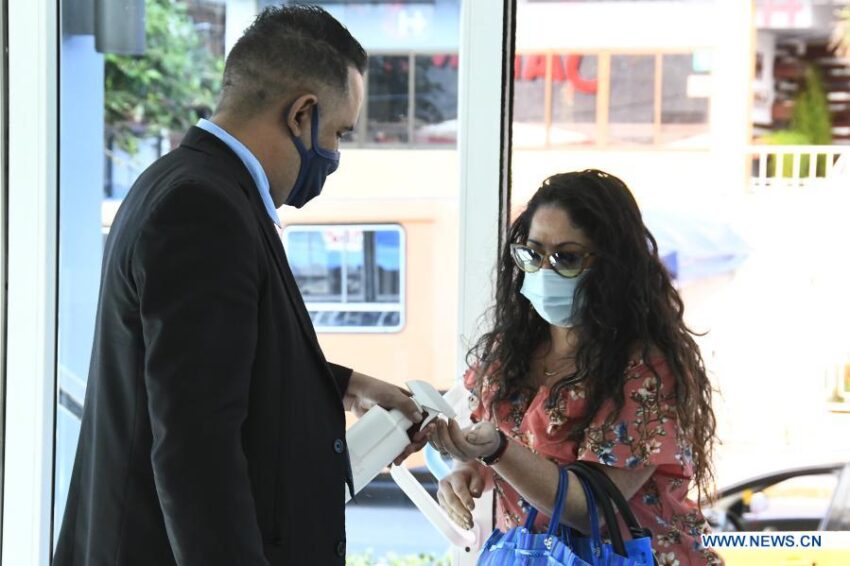
You must be logged in to post a comment.